“A Hidden Life” (2019). Cast: August Diehl, Valerie Pachner, Maria Simon, Karin Neuhäuser, Matthias Schoenaerts, Franz Rogowski, Bruno Ganz, Tobias Moretti, Ulrich Mathes, Karl Markovics, Michael Nyqvist, Johannes Krisch, Johan Leysen, Alexander Fehling, Ida Mutschlechner, Maria Weger, Aennie Lade. Director: Terrence Malick. Screenplay: Terrence Malick. Web site. Trailer.
Following our conscience often poses us with some of the most potent dilemmas we will encounter during our lifetimes. Such situations force us to confront doing what we believe to be the right thing in the face of circumstances that would seek to compel us to respond otherwise. The effect may be confounding, perhaps even paralyzing, but it generally pushes us to follow our hearts and minds, to address our innermost beliefs in being true to ourselves. So it was for a mild-mannered everyman saddled with dire conditions in the new fact-based historical drama, “A Hidden Life.”
In the idyllic mountain village of St. Radegrund, Austria, the horrors of World War II seem a world away. In fact, it’s the perfect setting for peasant farmer Franz Jãgerstãtter (August Diehl) to live out the life of peace and contentment that he so fervidly loves. With his wife Fani (Valerie Pachner) and their three daughters (Ida Mutschlechner, Maria Weger, Aennie Lade), Franz carves out a modest but comfortable living, eventually inviting his mother, Rosalie (Karin Neuhäuser), and Fani’s sister, Resie (Maria Simon), to come live with them. Together they all share good relations with their neighbors in this tightly knit community, and they derive ample solace from their involvement with the local Roman Catholic parish under the guidance of Father Fürthauer (Tobias Moretti). It’s an existence that gives them everything they need.
[caption id="attachment_11226" align="aligncenter" width="350"] Peasant farmer Franz Jãgerstãtter (August Diehl) enjoys an idyllic life in the mountain village of St. Radegrund, Austria in spite of the ravages of World War II hanging over him and his family in the new fact-based historical drama, “A Hidden Life.” Photo by Reiner Bajo, courtesy of Fox Searchlight Pictures.[/caption]
Peasant farmer Franz Jãgerstãtter (August Diehl) enjoys an idyllic life in the mountain village of St. Radegrund, Austria in spite of the ravages of World War II hanging over him and his family in the new fact-based historical drama, “A Hidden Life.” Photo by Reiner Bajo, courtesy of Fox Searchlight Pictures.[/caption]
Unfortunately, the outside world unavoidably intrudes upon their way of life. With Austria under the control of Adolf Hitler’s Third Reich, all eligible men are called upon to partake in basic military training. Franz initially resists the idea, but he eventually relents, fulfilling his civic obligation. However, upon word of France’s surrender, with many believing that the war will be over soon, Franz is sent back home, hoping his duty is behind him and giving him encouragement that he can return to a normal life permanently. But, as quickly becomes apparent, the war is far from over, and Franz is called up for military service.
Franz is more troubled about serving as a soldier than he was about going through basic training. The reason: He’s unwilling to take the oath of allegiance to Hitler and the Third Reich that all new recruits are required to make. When he considers what the Nazis have done to the German people and the residents of neighboring countries, he can’t bring himself to pledge his loyalty to a regime whose policies and practices he fundamentally disagrees with. He’s sincere about his opposition, and, to demonstrate his reluctance, he even goes so far as to consult the head of the local diocese, Bishop Fliesser (Michael Nyqvist), for advice. However, in doing so, Franz doesn’t get the answer he expects; rather than the Bishop telling him he should follow his conscience, he’s told that he has a duty to the Fatherland that he must honor lest his loyalty be called into question.
What’s more, when word of Franz’s hesitancy to pledge his allegiance spreads throughout St. Radegrund, he’s labeled a traitor. He and his family are demonstrably ostracized by most community residents, and the town’s mayor (Karl Markovics) openly chastises Franz for his disloyalty. As Franz wrestles with his decision, life at home becomes increasingly difficult for everyone.
[caption id="attachment_11227" align="aligncenter" width="350"]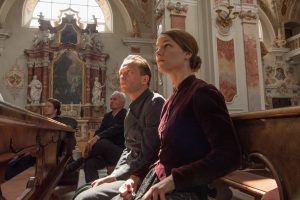 Farmer Franz Jãgerstãtter (August Diehl, center) and his wife, Fani (Valerie Pachner, right), derive tremendous faith from their Roman Catholic parish in the face of perils threatening to destroy their peaceful existence in World War II Austria in writer-director Terrence Malick’s “A Hidden Life.” Photo by Reiner Bajo, courtesy of Fox Searchlight Pictures.[/caption]
Farmer Franz Jãgerstãtter (August Diehl, center) and his wife, Fani (Valerie Pachner, right), derive tremendous faith from their Roman Catholic parish in the face of perils threatening to destroy their peaceful existence in World War II Austria in writer-director Terrence Malick’s “A Hidden Life.” Photo by Reiner Bajo, courtesy of Fox Searchlight Pictures.[/caption]
After considerable soul-searching, Franz finally decides to report for duty, much to Fani’s dismay. He believes he must fulfill his obligation. But, despite this sense of responsibility to his country, he has no intention of taking the oath, honoring his responsibility to himself. And, when he follows through on this intention, he’s thrown in jail, first in a holding facility in Enns and then later in a prison in Berlin.
While awaiting trial for his “crime,” Franz is subjected to all manner of brutality at the hands of prison guards, not to mention the harsh living conditions of this new existence. His only source of comfort throughout this ordeal is his ability to exchange letters with Fani. His love for his wife fills him with the strength he needs to carry on, a feeling that she likewise draws upon to keep up with the demands of running the farm. But, as time passes, Franz’s prospects look progressively bleak as he holds fast to his decision.
When the time for Franz’s trial comes, his lawyer (Alexander Fehling) urges him to take the oath, given that it will almost assuredly result in dismissal of the charges against him. In fact, given the looming consequences, Franz’s attorney tries to convince him to take this step even if he doesn’t mean what he says. But Franz remains resolute, knowing that a lie would be a betrayal to himself on par with the repulsion he would feel for actually taking the oath. And so he places conscience before coercion, a decision that leaves him in a precarious position and facing an uncertain future, one whose impact is certain to affect both Franz and everyone he loves.
[caption id="attachment_11228" align="aligncenter" width="350"]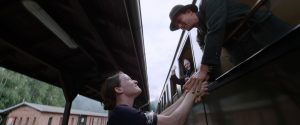 Austrian farmer Franz Jãgerstãtter (August Diehl, right) puts up a brave front as he bids farewell to his wife, Fani (Valerie Pachner, left), as he leaves his mountain village to fulfill military obligations during World War II in “A Hidden Life.” Photo courtesy of Fox Searchlight Pictures, © 2019 Twentieth Century Fox Film Corporation.[/caption]
Austrian farmer Franz Jãgerstãtter (August Diehl, right) puts up a brave front as he bids farewell to his wife, Fani (Valerie Pachner, left), as he leaves his mountain village to fulfill military obligations during World War II in “A Hidden Life.” Photo courtesy of Fox Searchlight Pictures, © 2019 Twentieth Century Fox Film Corporation.[/caption]
Difficult situations such as this test the resolve of even the strongest among us. These kinds of circumstances pit us against ourselves, most notably our innermost beliefs, scenarios that can carry significant consequences. The importance in this rests with the fact that our responses to such challenges ultimately affect what we experience. And that’s because our beliefs shape the reality in which we find ourselves, the cornerstone principle of the conscious creation process, the philosophy that maintains we draw upon these metaphysical building blocks in manifesting our existence.
Franz has indeed set himself up for quite a test through his experience. As an openly conscientious objector – something virtually unheard of in his day and age – he places his personal beliefs before those of what’s expected of him. And, even though he ends up reporting for duty, he can’t bring himself to take the next step, one that he believes in his heart is wrong, despite the consequences involved.
Franz’s actions are significant for a variety of reasons. Not only are they an act of defiance to circumstances with which he fundamentally disagrees, but they are also a shining example of the principle of integrity, one of the key elements that affects the functioning of the conscious creation process. When we incorporate this principle into the beliefs that go into our manifestation efforts, we infuse the process with a heightened sense of personal earnestness, a quality that reflects the sincerity of our being, something that enables us to be supremely truthful with ourselves. And that, in turn, allows us to materialize a reality most in line with what we genuinely believe, one that most faithfully aligns with our innate heartfelt convictions.
Given what Franz adheres to, he truly faces quite an arduous path going forward. However, the beliefs behind these developments mirror who he really is. As becomes apparent in the film, he’s a devout man of faith who staunchly abides by his principles. If he’s to live with himself, he knows he must follow his heart, no matter how difficult his personal odyssey might be. He simply can’t capitulate to the mentality of being someone who’s “just following orders.” By maintaining his sense of integrity, he significantly increases the likelihood that his reality will fall into line with his beliefs, no matter what that may entail.
[caption id="attachment_11229" align="aligncenter" width="350"]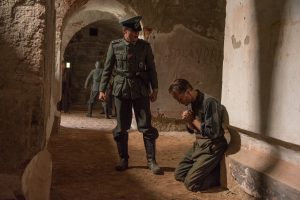 Conscientious objector Franz Jãgerstãtter (August Diehl, right) faces the brutality of prison life when he refuses to swear an oath of allegiance to Adolf Hitler and the Third Reich as part of his military service during World War II in the new fact-based historic drama, “A Hidden Life.” Photo by Reiner Bajo, courtesy of Fox Searchlight Pictures.[/caption]
Conscientious objector Franz Jãgerstãtter (August Diehl, right) faces the brutality of prison life when he refuses to swear an oath of allegiance to Adolf Hitler and the Third Reich as part of his military service during World War II in the new fact-based historic drama, “A Hidden Life.” Photo by Reiner Bajo, courtesy of Fox Searchlight Pictures.[/caption]
Some might question the wisdom of Franz’s beliefs and actions in light of the consequences he faces. However, perhaps one of his missions in life is to set an example for others, to become a prototype for the conscientious objector model, something that no one may have done before (or at least not as openly as he does). It could be that a sentiment like the one expressed by Franz may play a vital role in helping to reshape a culture predicated on war and violence, especially if enough other individuals follow his lead. But, if the example he sets is to catch on, it has to start somewhere with someone, and maybe that’s where Franz comes in as a volunteer willing to establish the standard and make it known to the world, perilous though that course may be.
Charting such unknown territory requires a great deal of courage, and that’s another element that factors into Franz’s beliefs. By being willing to confront his fears, he gives himself the personal strength and fortitude he needs to follow this path. As conscious creators are well aware, the philosophy draws heavily upon the notion of “nothing ventured, nothing gained,” and that’s especially true in heroic endeavors like this. By fortifying himself in this way, Franz further increases the chances of being able to fulfill his aspirations and achieve something that the world has never seen before. That’s especially crucial for ventures that stand to benefit us all, both individually and collectively.
In taking the steps that he does, Franz freely embraces his sense of personal responsibility, an inherent aspect of conscious creation. That’s vital, because it’s something we can’t escape when we engage in this practice, no matter how readily or reluctantly we may embrace (or even recognize) this intrinsic connection. Franz knows what he’s doing, in spite of the consequences, yet he does so anyways, accepting conditions for what they are. He realizes that he must do this if he’s to live his truth and attain his goal, no matter how problematic that may be for him and those he cares about.
Accepting responsibility is also essential for those of us seeking to live out our value fulfillment, the conscious creation concept associated with being our best, truest selves for the betterment of ourselves and those around us. For those of us looking to invoke this in an initiative aimed at helping to change the character of society, this is critical if we hope to succeed. Franz rises to the occasion on this front, and, even though his story may not have been well known until now, his legacy has been established, one that’s worthy of being emulated in helping us to create a better world for everyone.
[caption id="attachment_11230" align="aligncenter" width="350"]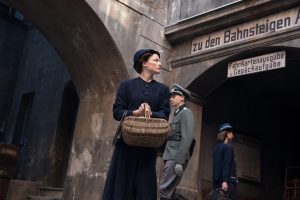 When faced with a perilous fate for her imprisoned husband, Fani Jãgerstãtter (Valerie Pachner, center) travels to Berlin from her Austrian mountain village to provide much-needed comfort and strength in Terrence Malick’s “A Hidden Life.” Photo courtesy of Fox Searchlight Pictures, © 2019 Twentieth Century Fox Film Corporation.[/caption]
When faced with a perilous fate for her imprisoned husband, Fani Jãgerstãtter (Valerie Pachner, center) travels to Berlin from her Austrian mountain village to provide much-needed comfort and strength in Terrence Malick’s “A Hidden Life.” Photo courtesy of Fox Searchlight Pictures, © 2019 Twentieth Century Fox Film Corporation.[/caption]
While writer-director Terrence Malick’s stream of consciousness style of filmmaking may not be for everyone, he certainly presents his best example of this kind of work in his latest offering. As with nearly all of his pictures (which are known for including beautiful imagery for its own sake and not necessarily as a means for moving the story forward), this release could still use some judicious editing, considering its nearly three-hour runtime. However, given that this fact-based film features a more narrative-driven focus than some of his other works, that change, coupled with his signature style, make for a moving combination, one that’s simultaneously touching and beautiful to look at. Diehl and Pachner give quietly impassioned performances as protagonists wrestling with crises of conscience in World War II Austria, set against the beauty of their native countryside and the ugliness of Adolf Hitler's Nazi regime. Admittedly, this picture may try the patience of even the most diehard moviegoer, but it's worth sitting through even the slow passages given the rewards on offer.
“A Hidden Life” entered awards season with high hopes of significant recognition after winning the François Chalais Award and receiving a distinguished Palme d’Or nomination at the 2019 Cannes Film Festival. However, once the contenders in year-end competitions were announced, the picture didn’t live up to expectations. While the release was named one of the National Board of Review’s Top 10 Independent Films, its only other recognition came in the form of an Independent Spirit Award nomination for best feature. Considering that the crop of eligible 2019 releases left something to be desired, it’s unfortunate that this offering was summarily excluded from so many award programs.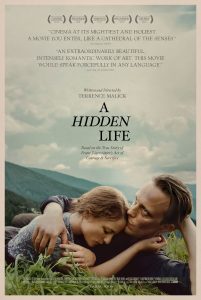
It would be quite a world to live in if we were to have more individuals like Franz in our midst. Indeed, if we had just one courageous soul like him for every 10 others who believed and acted contrarily, our society and the greater reality of which it’s a part would likely be a very different place. That’s why it’s so important that the inspiring stories of heroes like this humble Austrian farmer are shared with the world, to provide us with examples of how to live differently than how we’re told, to bring about an existence in which we’re truthful with ourselves and courageously fulfill our intents to live lives in line with our hearts. It’s a possibility, to be sure, but it’s up to us to envision such an existence – and then to take the steps necessary to make it happen.
Copyright © 2019-20, by Brent Marchant. All rights reserved.
Friday, January 17, 2020
‘A Hidden Life’ pushes us to listen to our heart
Subscribe to:
Post Comments (Atom)

No comments:
Post a Comment